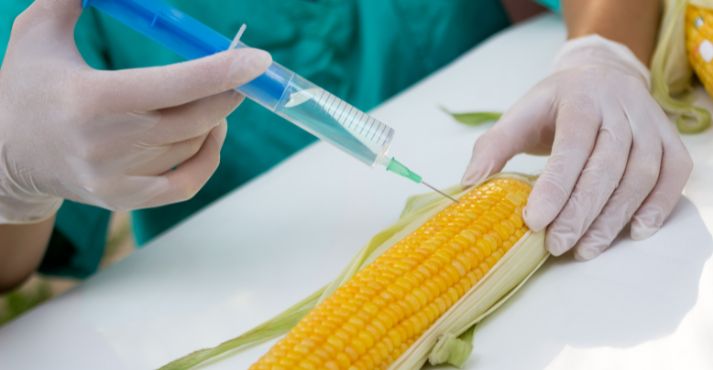Food science is a multidisciplinary marvel in food, unveiling the scientific principles behind production, processing, safety, and nutrition. It goes beyond flavors, integrating biology, chemistry, and nutrition to understand the scientific foundation of our meals.
Food science blends various disciplines, from meticulous production to ensuring safety, bringing together a range of expertise. Food technology innovates production methods in this journey, while nutritional science explores how our food contributes to well-being.
Let’s uncover the foundations of this fascinating field, exploring the science that transforms raw ingredients into culinary masterpieces.
The Core Concepts of Food Science
1. Unraveling Food Chemistry
Food chemistry is key to unraveling the composition of our meals, delving into the molecular makeup of food components. It sheds light on how elements combine to create the dishes we enjoy.
Structural Insights:
Exploring the structure of food components unveils the secrets of texture and form. Whether it’s a potato chip’s crispiness or a steak’s tenderness, understanding structure enriches our appreciation for diverse culinary experiences.
Chemical Reactions in the Kitchen:
Chemistry plays a vital role in the kitchen, driving reactions and contributing to the rich tapestry of tastes. These reactions shape flavors from the Maillard reaction in roasted coffee beans to sugar caramelization enhancing sweetness.
Impact on Flavor:
Food chemistry’s essence lies in its impact on flavor. Understanding the chemical properties of food provides insights into the development of flavors that tantalize our taste buds, creating a unique balance of sweet, savory, bitter, and umami.
Nutritional Influence:
Beyond sensory experiences, food chemistry is pivotal in nutrition, exploring how food’s chemical composition influences health. It ensures a delicate harmony between taste and nutritional value.
2. Exploring Food Microbiology:
Let’s take a closer look at food microbiology, where we examine the tiny world of microorganisms in our meals.
It’s like investigating the unseen heroes that ensure our food is safe, stays fresh, and contributes to unique flavors through fermentation.
Keeping Our Food Safe:
Microorganisms act as behind-the-scenes guardians, working hard to keep our food safe. Food microbiology helps us understand their impact, identify potential risks, and implement measures to ensure our food is free from contamination and spoilage.
Preserving Freshness:
In the world of preserving food, microbiology plays a crucial role. By understanding how microorganisms interact with food, we can develop smart strategies to ensure our food stays fresh for longer, maintaining its taste and nutritional goodness.
The Magic of Fermentation:
Food Microbiology reveals the magic happening in our favorite foods when discussing fermentation. Whether it’s the rise of bread or the tanginess of yogurt, microorganisms are the unsung heroes, enhancing flavors and preserving and boosting nutritional value.
Ensuring a Safe Culinary Experience:
At its core, food microbiology is all about making sure our food is safe to eat. By studying the microbial aspects of food, we empower ourselves to take steps that ensure our culinary experiences are enjoyable and secure.
3. The Intersection of Food and Engineering:

Let’s explore food engineering, where engineering principles take center stage in food. It’s like bringing the precision of engineering to our kitchens, influencing how our food is processed, packaged, and preserved.
Efficiency in Processing:
Food engineering is all about efficiency. By applying engineering principles to food processing techniques, we ensure that the journey from raw ingredients to the final product is as smooth and optimized as possible, maintaining quality at every step.
Packaging with Precision:
Have you ever wondered about the engineering behind food packaging? Food engineering unveils the magic. It’s not just about keeping our snacks fresh; it’s about using engineering savvy to design packaging that protects, preserves, and presents our food with precision.
Preservation Mastery:
Food engineering is the maestro in the domain of preservation. It introduces engineering techniques to ensure that our food stays fresh and retains its quality for longer, providing us with tasty but also safe and durable options.
Quality Assurance Symphony:
At the core of food engineering lies Quality Assurance. By integrating engineering principles into the food industry according to the latest trends, we create a symphony of quality – a seamless blend of efficiency and excellence that ensures the food reaching our plates meets the highest standards.
Applications of Food Science
Food Product Development
Dive into the domain of Food Product Development, where food science takes center stage in crafting new culinary experiences. It’s the art and science of innovating taste and texture, ensuring every bite brings a delightful fusion of flavors and mouthfeel.
Crafting Culinary Innovations:
Food science isn’t just about following recipes but crafting culinary innovations. Through product development, we explore the creative side of food science, introducing novel flavors and textures that captivate taste buds and redefine the culinary landscape.
Balancing Nutrition and Flavor:
In the world of Food Product Development, it’s a delicate dance between nutrition and flavor. Food science guides the creation of products that taste exceptional and offer nutritional value, catering to the evolving preferences of health-conscious consumers.
Adapting to Market Trends:
Food science isn’t static; it evolves with market trends. We see how food scientists adapt to changing consumer preferences through product development, crafting products that resonate with contemporary tastes and lifestyles.
Innovations for Every Palate:
From plant-based alternatives to novel snacks, Food Product Development showcases how food science continually innovates for every palate. It’s a journey of exploration ensuring that the diversity of consumer preferences is met with a rich tapestry of food options.
Safeguarding Food Quality
Delve into the crucial domain of food quality and safety, where food science plays a central role in assuring that every bite meets top-notch standards. It goes beyond mere taste tests, embodying a commitment to guarantee that our food upholds the highest quality.
Thorough Examination Processes:
Food science introduces thorough examination processes to ensure food safety. These meticulously designed protocols shield against potential risks, ensuring the products’ way to our tables undergo comprehensive scrutiny.
Navigating Regulatory Requirements:
Food quality and safety rely on more than chance; they adhere to regulatory standards. Food science guides the intricate landscape of regulations, ensuring that every facet of food production aligns with strict standards set for consumer well-being.
Precision in Identifying Risks:
The essence of food safety lies in precise risk assessment. Through the lens of food science, risks are identified, carefully evaluated, and mitigated, ensuring that the entire journey from farm to fork is safeguarded against potential hazards.
Harmonizing with Standards:
Food science collaborates with regulatory expectations to ensure compliance at every stage. It’s a proactive approach where quality assurance and safety seamlessly integrate into food production, creating a reliable tapestry of trust.
Linking Food Science with Nutrition
Nutrition science, where the delicate interplay of food science and comprehensive nutritional insight takes the spotlight. It’s a journey into how scientific principles enlighten us about the nutritional content of our food and its profound impact on our health.
Decoding Nutritional Content:
Nutritional science is the codebreaker, deciphering the nutritional content encrypted in our meals. Meticulous analysis unveils vital information about the nutrients fueling our bodies, fostering a deeper connection between our eating and our overall well-being.
Impact on Health:
Beyond the plate, nutrition science explores the profound impact of our food choices on health. It’s not just about calories; it’s a nuanced understanding of how specific nutrients contribute to the functioning of our bodies, influencing everything from energy levels to disease prevention.
Nutritional Analysis at the Core:
The art of nutritional analysis lies at the core of nutrition science. It’s a process that goes beyond the surface, delving into the composition of our food to provide insights into how it can be a powerful contributor to our health and vitality.
Health and Food Science Synergy:
Nutrition and food science synergize in understanding the intricate relationship between our consumption and health. It’s a holistic approach that links scientific principles, nutritional content, and the broader impact on our well-being.
Shaping the Future with Sustainable Food
Sustainability in Focus
Explore the future of food science with a spotlight on sustainable food production. It’s not just a trend; it’s a vital shift towards practices that safeguard our environment.
Let’s delve into how farming, processing, and packaging innovations shape a more eco-friendly and sustainable food industry.
Greening the Farm:

Sustainable farming practices take center stage in the evolution of food production.
From regenerative agriculture to organic methods, the focus is on cultivating harmony with the environment, minimizing the ecological footprint, and promoting soil health for future generations.
Innovations in Processing:
Step into processing, where sustainability is a driving force. Innovations like energy-efficient technologies and waste reduction strategies are reshaping how our food is processed, emphasizing efficiency without compromising the quality and safety of the end product.
Eco-Friendly Packaging:
The future of sustainable food extends to packaging. Discover how the industry embraces eco-friendly materials and minimizes waste through innovative packaging solutions.
It’s about reimagining how we bring food from production to our tables while being mindful of the environmental impact.
Holistic Environmental Practices:
Sustainable Food Production is not a singular effort; it’s a holistic approach. Every step, from the farm to processing facilities and the final packaging, is marked by eco-friendly practices, creating a synergy that reflects a commitment to a sustainable and thriving planet.
Navigating Precision Nutrition
Precision Nutrition is an emerging field that navigates the intricacies of personalized dietary recommendations. Here, dietary plans are not one-size-fits-all; they are precisely tailored to an individual’s genetic makeup, lifestyle, and health aspirations.
The Science of Personalization:
Precision nutrition is akin to a scientific compass, guiding us through the nuances of individualized nutrition plans. It considers each person’s unique genetic blueprint, lifestyle choices, and health objectives, creating a roadmap for optimal well-being.
Genetic Makeup as a Guide:
Uncover how precision nutrition utilizes genetic makeup as a guide. It’s a journey into understanding how our genes influence our responses to different foods, allowing for customized diets that resonate with our bodies at a molecular level.
Individualized Nutrition Plans:
In precision nutrition, generic dietary advice gives way to individualized nutrition plans. These plans are meticulously crafted to align with personal preferences, health conditions, and the unique genetic markers that influence how our bodies process nutrients.
Health and Genetics Harmony:

Precision Nutrition harmonizes health goals with genetics.
It’s not just about what we eat; it’s a holistic approach that considers the interplay between our genetic predispositions and lifestyle choices, ensuring that nutrition plans align seamlessly with our pursuit of optimal health—exploring Biotechnology in Food, where scientific innovations take center stage.
Explore the multifaceted landscape, encompassing genetically modified organisms (GMOs), food fortification, and cutting-edge advancements in food production.
Genetic Modifications Unveiled:
Uncover the role of biotechnology through the lens of genetic modifications. Here, we delve into the science of GMOs, where the genetic makeup of organisms is precisely tailored to enhance characteristics like resilience, yield, and nutritional content.
Fortifying the Culinary Landscape:
Biotechnology contributes to fortifying our culinary world. Explore how food fortification, enabled by biotechnological interventions, enhances the nutritional profile of various food products, addressing deficiencies and promoting health on a broader scale.
Advancements in Food Production:
Witness the transformative impact of biotechnology on food production. Genetic engineering in food and biotechnological advancements are revolutionizing how we cultivate, harvest, and process food, ensuring efficiency, sustainability, and a resilient food supply.
GMOs and Fortification Synergy:
Biotechnology in Food Science unfolds as a dynamic force in the synergy of GMOs and fortification. It’s a domain where genetic modifications and fortification techniques collaborate to create a diverse, nutritionally enriched, and resilient food ecosystem.
Concluding Thoughts on Food Science
In wrapping up our exploration, it’s clear that food science is a dynamic force shaping the culinary landscape. From ensuring safety to innovations in nutrition and sustainability, it plays a pivotal role in our gastronomic journey.
A Recap of Food Science: The scientific backbone ensures our food is delicious and safe. Food science continues to push the boundaries of what’s possible in the culinary domain.
Importance in Shaping the Food Industry: food science is a cornerstone, laying the foundation for an industry that caters to our palates while embracing environmental responsibility and innovation.
Contributing to Innovations: From precision nutrition to sustainable practices, food science sparks innovation beyond taste, recognizing the role of food in our health and the planet’s well-being.














